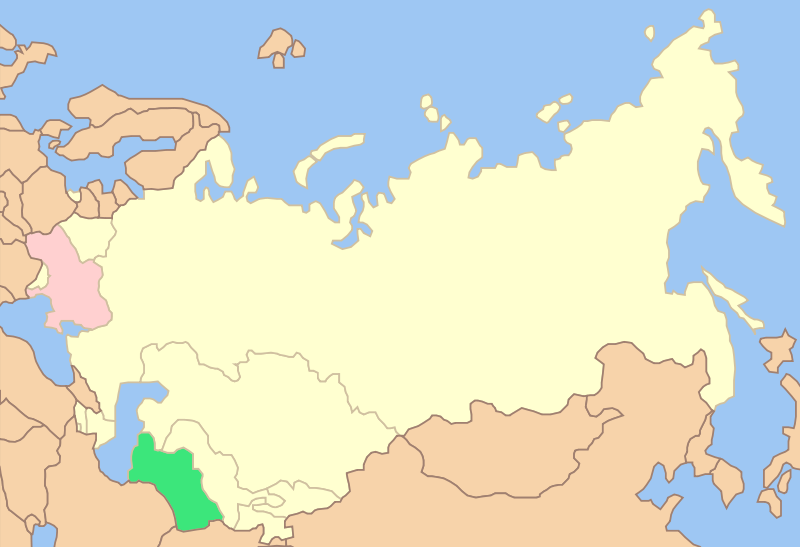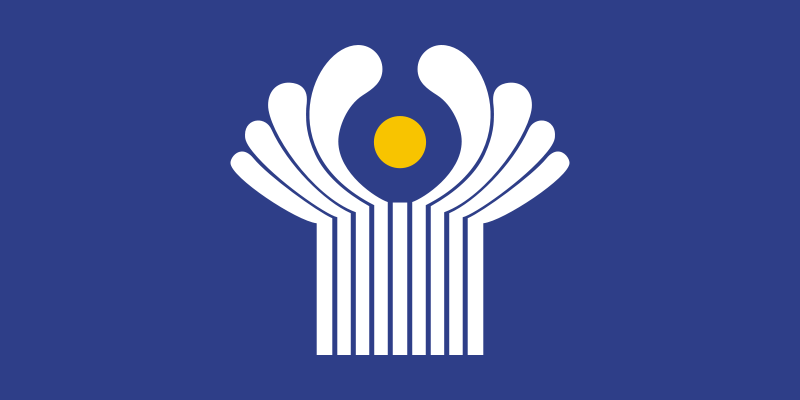Commonwealth of Indipendent States
 |  |
Name: Commonwealth of Indipendent States | |
| Acronym: CIS | |
| Year of foundation: 1991 | |
| Headquarters: Minsk, Belarus | |
| CIS documents: go to page | |
| Official website: go to page | |
FOCUS ON | |
| CIS Inter Parliamentary Assembly |
Description
The Commonwealth of Independent States (CIS) is a regional organization established on 8 December 1991 by Russia, Belarus, and Ukraine. Armenia, Azerbaijan, Kazakhstan, Kyrgyzstan, Moldova, Turkmenistan, Tajikistan, and Uzbekistan joined on 21 December 1991. The CIS aims to promote the coordination of its members in the realm of trade, finance, lawmaking, and security, and to support cooperation on democratization and cross-border crime prevention. It participates in UN peacekeeping forces.
Member States
The Commonwealth of Independent States has 9 members, plus two States which are taking part in some activities:
DATE | COUNTRY | STATUS |
8 December 1991 | Belarus Russia | Full members |
8 December 1991 | Ukraine | de facto participating; officially not a member |
21 December 1991 | Armenia Azerbaijan Kazakhstan Kyrgyzstan Moldova Tajikistan Uzbekistan | Full members |
21 December 1991 | Turkmenistan | unofficial associate member |
Brief History
On 8 December 1991, the leaders of Belarus, Russia, and Ukraine signed a “Creation Agreement” on the dissolution of the Soviet Union and the creation of CIS as its successor entity. At the same time they declared that the new organization would be open to all republics of the former Soviet Union, as well as other nations sharing the same goals. The “Creation Agreement” abolished the USSR and stated that all the member States were sovereign and independent nations.
On 21 December 1991, the leaders of eight former Soviet Republics (Armenia, Azerbaijan, Kazakhstan, Kyrgyzstan, Moldova, Turkmenistan, Tajikistan, and Uzbekistan) joined the CIS. Georgia joined two years later, in December 1993, while the three Baltic states of Estonia, Latvia, and Lithuania, chose not to take part.
The Creation Agreement remained the main constituent document of the CIS until January 1993, when the CIS Charter was adopted. The charter formalized the concept of membership: a member country is defined as a country that ratifies the CIS Charter (sec. 2, art. 7). Turkmenistan has not ratified the charter and changed its CIS standing to associate member as of 26 August 2005 in order to be consistent with its UN-recognized international neutrality status. Although Ukraine was one of the three founding countries and ratified the Creation Agreement in December 1991, Ukraine did not ratify the CIS Charter and formally is not a member of the CIS.
In September 1993 the Heads of the CIS States signed an Agreement on the creation of Economic Union to form common economic space grounded on free movement of goods, services, labour force, capital; to elaborate coordinated monetary, tax, price, customs, external economic policy; to bring together methods of regulating economic activity and create favourable conditions for the development of direct production relations.
Three months later, on 3 December 1993, Georgia joined the Commonwealth.
In order to facilitate further integration, the Agreement on deepening of integration in economic and humanitarian field of four countries (Belarus, Kazakhstan, Kyrgyzstan, Russia) and Agreement on creation of Commonwealth of Sovereign Republics (Belarus and Russia) with creation of corresponding coordinating bodies were signed in 1995. In February 1999 by the decision of the Interstate Council of four countries (Belarus, Kazakhstan, Kyrgyzstan, Russia) the Republic of Tajikistan was recognized as participant of the customs union enjoying full rights.
In October 2000 the Heads of five countries (Belarus, Kazakhstan, Kyrgyzstan, Russia, Tajikistan) signed an Agreement on the creation of Eurasian Economic Community (EAEC). At present Armenia, Moldova and Ukraine have the status of the observer under EAEC. In October 2005 Uzbekistan made the statement to join this organization.
In September 2003 Belarus, Kazakhstan, Russia and Ukraine signed an Agreement on Formation of CES (Common Economic Space).
Between the years of 2003 and 2005, three CIS member states experienced a change of government in a series of color revolutions: Eduard Shevardnadze was overthrown in Georgia, Viktor Yushchenko was elected in Ukraine, and, lastly, Askar Akayev was toppled in Kyrgyzstan.
In February 2006, Georgia officially withdrew from the Council of Defense Ministers: this member States was working to join NATO and could not be part of two military structures simultaneously. However, Georgia remained a full member of the CIS but following the South Ossetian war in 2008, President Saakashvili announced during a public speech in the capital city Tbilisi that Georgia would leave the CIS and the Georgian Parliament voted unanimously (on 14 August 2008) to withdraw from the regional organization. On 18 August 2008 the Ministry of Foreign Affairs of Georgia sent a note to the CIS Executive Committee notifying it of the aforesaid resolutions of the Parliament of Georgia and Georgia’s withdrawal from CIS. In accordance with the CIS Charter, Georgia’s withdrawal came into effect 12 months later, on 18 August 2009.
In March 2007, Igor Ivanov, the secretary of the Russian Security Council, expressed his doubts concerning the usefulness of CIS, and emphasizing that the Eurasian Economic Community became a more competent organization to unify the biggest countries of the CIS. In May 2009 the six countries Armenia, Azerbaijan, Belarus, Georgia, Moldova and Ukraine joined the Eastern Partnership, a project which was initiated by the European Union.
CIS Structure and Decision-making Procedures
The Charter Bodies of the CIS are: the Council of the Heads of States, the Council of the Heads of Governments, the Council of Foreign Ministers, the Council of Defense Ministers, the Council of Commanders-in-Chief of Frontier Troops, the Inter-Parliamentary Assembly, and the Economic Court.
The Executive Bodies of the CIS are: the Economic Council, the Council of Permanent Plenipotentiary Representatives of the States-Participants of the Commonwealth under Charter and Other Bodies of the Commonwealth, and the Executive Committee.
Council of the Heads of States
This is a supreme body of the CIS which discusses and solves any principle questions of the Commonwealth connected with the common interests of the states - participants.
Council of the Heads of Governments
This Council coordinates cooperation of the executive authorities of the states - participants in economic, social and other spheres of their common interests.
Decisions of the Council of the Heads of States and the Council of the Heads of Governments are adopted by consensus. Any state may declare about its lack of interest in one or another question, the fact being not considered as an obstacle for adopting a decision.
Council of Foreign Ministers
The main executive body ensuring cooperation in the field of foreign policy activities of the states - participants of the CIS on the matters of mutual interest, adopting decisions during the period between the meetings of the Council of the Heads of States, the Council of the Heads of Governments and by their orders.
Council of Defense Ministers
This is a body of the Council of the Heads of States responsible for military policy of the states - participants of the CIS. Its working office is a Staff which coordinates military cooperation of the CIS member states, prepares and holds meetings of the Council of Defence Ministers, organizes the activities of groups of military observers and collective forces for peace keeping in the CIS.
Council of Commanders-in-Chief of Frontier Troops
This is a body of the Council of the Heads of States responsible for guarding outer frontiers of the states - participants and securing stable situation there. Its working office is a Coordinating Service of the Council which organizes preparation and holding of the meetings of this Council, implementation of the decisions adopted by it.
Inter-Parliamentary Assembly
The Assembly was established in March 1995 by the leaders of Supreme Soviets (parliaments) of the Commonwealth countries as a consultative institution to discuss problems of parliamentary cooperation and develop proposals by the parliaments of the CIS states.
The Assembly consists of parliamentary delegations of the states - participants of the CIS.
The activities of the Assembly are carried out by the Assembly Council which comprises the leaders of the parliamentary delegations.
The Assembly Secretariat, headed by Secretary-General, was created to ensure the work of the Inter-Parliamentary Assembly, its Council and commissions.
Economic Court
Economic Court functions with the aim of ensuring the meeting of economic commitments in the framework of the CIS.
Its terms of reference include settlement of interstate economic controversy arising in meeting economic commitments envisaged by Agreements and decisions of the Council of the Heads of States and the Council of the Heads of Governments of the CIS.
Economic Council
The main executive body which ensures implementation of the decisions of the Council of the Heads of States and the Council of the Heads of Governments of the Commonwealth of Independent States on realization of the Agreement for creation of free trade zone, Protocol to it, as well as for other matters of socio-economic cooperation. The Council adopts the decisions on the matters related to its competence and by the orders of the Council of the Heads of States and the Council of the Heads of Governments of the CIS.
Economic Council consists of the Deputy Heads of Governments of states-participants of the CIS.
Executive Committee
It is the unite permanently functioning executive, administrative and coordinating body of the CIS, which organizes the activities of the Council of the Heads of States, Council of the Heads of Governments, Council of Foreign Ministers of states - participants of the CIS, Economic Council and other bodies of the Commonwealth, prepares proposals on extending economic cooperation in the framework of the CIS, creating and functioning free trade zone, ensuring favourable conditions for transition to higher stage of economic cooperation, developing common economic space in future, jointly with the states - participants and the bodies of the Commonwealth develops proposals and draft documents aimed at the development of states - participants of the CIS in political, economic, social and other spheres.
Bodies of Branch Cooperation
They are: the Anti -Terrorist Center, the Interstate Bank, the Interstate Statistical Committee, the Interstate Council on Standardization Metrology and Certification, the Interstate Council on Emergency Situation of Natural and Anthropogenic Character, the Interstate Council on Antimonopoly Policy, the Coordinating council of the states-participants of the CIS on Informatization under the Regional Commonwealth in the Field of Communications, the Electric Energy Council, the Interstate Council on Aviation and Air Space Use, the Council of the Heads of Statistical Services of the States-Participants of the Commonwealth, and the Council of the Heads of Customs Services of the States-Participants of the Commonwealth.
